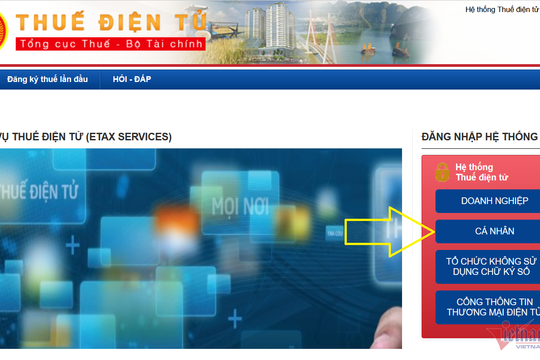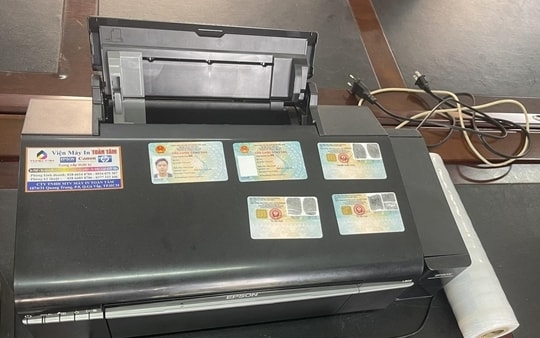Abolishing paper household registration books: Convenient but still problematic
(Baonghean.vn) - After nearly 2 months of abolishing paper household registration books, in addition to the conveniences it brings, people still encounter some difficulties and problems in the process of handling administrative procedures.
Still stuck
After abolishing paper household registration books, from January 1, 2023, the authorities will manage people's residence information electronically, also known as electronic household registration books. Specifically, "abolishing" paper household registration books and replacing them with citizen identification cards has helped reduce many administrative procedures. According to Mr. Duong Sy Dan, residing in Le Loi ward, Vinh city, abolishing paper household registration books helps people avoid having to carry a lot of documents when doing administrative procedures, avoiding the loss and confusion of documents like before...
 |
People do administrative procedures at the One-Stop Department. Photo: D.C. |
However, in addition to the conveniences, demonstrating progress in administrative procedure reform, there are still problems that cause difficulties and waste time for people. For example, Mr. NVA, residing in Truong Thi ward, said: Recently, he needed money to invest in business development. When he went to a bank in Vinh city to apply for a loan, the bank staff asked for confirmation of residence, with the reason that in order to process loan applications with mortgaged assets (land and house), customers need to have confirmation of residence.
Similar to Mr. NVA's case, Mr. Nguyen Duc Hung, residing in Nghi Kim commune, Vinh city, when doing land transfer procedures, is also required to have a certificate of residence. According to Mr. Nguyen Duc Hung, when preparing documents to transfer land, the real estate office's consultant instructed that he needed to prepare a citizen identification card, marriage certificate, and residence confirmation to carry out the procedures at the notary office. According to Mr. Hung, "Abolishing the paper household registration book is thought to reduce the procedures in administrative transactions, but it creates a certificate of residence. This is both time-consuming and laborious, requiring running back and forth from the ward People's Committee, the ward police, and then to the notary office."
Confirming this issue, a representative of a notary office in Vinh City said that the chip-embedded citizen identification card has full information of the person making the transaction. However, up to now, notary offices in the area do not have CCCD card scanners, so by the time the citizen has to go to the notary office, the information on the CCCD card may have changed, so it is necessary to ask the person making the transaction to provide a certificate of residence from the competent authority.
 |
Officials from the Provincial Public Administration Service Center guide people to register for administrative procedures. Photo: Nguyen Nguyen |
In addition, it is known that in some localities, when people request to resolve administrative procedures related to the issuance of a certificate of single status, they still have to go to the police to request confirmation of residence. Regarding this issue, Ms. D, a civil servant at a unit in Vinh City, said that her family member in Thanh Chuong went to the commune People's Committee to request a certificate of single status to go to Phu Tho to register for marriage, but when they went to the commune People's Committee, the judicial officer still asked them to go to the police to get confirmation of residence, with the reason that the data connection could only read some information and could not trace the residence process. Therefore, it was necessary to go to the commune police to confirm residence.
Need to synchronize soon
From the above mentioned issue, according to the confirmation of a police officer in Vinh City, every day the police in the ward receives requests to confirm the place of residence for an average of 10 people, mainly to carry out administrative procedures related to land, loans, notarization procedures...
Regarding the reason, although citizens present their CCCD cards, currently wards, communes, notary offices... do not have CCCD card scanners, so they cannot use the QR Code reading method, or read the chip on the CCCD card, while this is the fastest method, providing the most complete information. Also according to the ward police officer, instead of having to come in person, citizens can send a request to confirm information about their place of residence via online public services to be confirmed by electronic documents. However, most citizens do not know how to do it, and ward and commune officials have not really given instructions, so the responsibility is pushed to the police.
 |
| The Provincial Police Department of Administrative Management of Social Order guides people on the walking street to register for an electronic identification account. Photo courtesy |
Regarding this issue, the Department of Justice recently coordinated with the Center for Research and Application of Population Data and Citizen Identification under the National Population Data Center - Department of Administrative Management of Social Order (Ministry of Public Security) to organize a conference with the content of surveying and exchanging information on the business processes of notary organizations, Public Administration Service Centers and the need for citizen information authentication; Introducing the features and uses of the equipment of the Center for Research and Application of Population Data and Citizen Identification.
According to Ms. Nguyen Thi Mai, Deputy Head of the Judicial Support Department, Nghe An Department of Justice: At the conference, representatives of notary offices raised difficulties in confirming documents related to administrative procedures after abolishing paper household registration books, such as not having a CCCD card scanner, so they still have to ask people to provide a residence confirmation, leading to inconvenience due to time and effort. On this issue, at the conference, the Department also informed notary offices that in cases where the information on the documents does not match, it is necessary to confirm the place of residence, not applicable in all cases. At the same time, based on the needs of notary offices, the Department has proposed to purchase a CCCD card scanner, but currently the supplier does not have one.
 |
| Taking photo to make citizen identification card at One-stop Department of Nghe An Provincial Police. Photo for reference |
Talking to us, Colonel Luong The Loc - Head of the Police Department of Administrative Management of Social Order of the Provincial Police affirmed: We have done a lot of propaganda, when we abandonedhousehold registration bookThere are 7 methods that citizens, branches, and units that handle administrative procedures can use, including: Using an electronic chip-embedded CCCD card as a legal document proving personal information and permanent residence. Using a QRCode reader on a chip-embedded CCCD card, integrated with a computer or mobile device to read citizen information on the CCCD card. Using a chip reader on the CCCD card. People can look up and exploit personal information online at: https://dichvucong.dancuquocgia.gov.vn and follow the instructions. Using the VNeID application to display information on electronic devices to serve the settlement of administrative procedures and civil transactions. Using a certificate of residence information (issued by the police). Using a personal identification number notification and information in the national population database to prove people's residence.
Thus, abolishing paper household registration books means abolishing the form of managing residential data using books and papers. The State still maintains household registration management, but only replaces the form of information management with modern and more effective information technology software. Therefore, with the reality that there are still problems causing difficulties for people, all levels and sectors need to promptly check and guide to remove them.
It is known that this is also one of the key tasks of the working groups established under Decision No. 2416/QD-UBND of the Provincial People's Committee to be deployed in March 2023. In particular, regarding administrative procedure reform: Departments, branches, sectors, district-level People's Committees, and commune-level People's Committees continue to review, evaluate, and propose simplification of dossier components and implementation procedures. Continue to improve and improve the operational efficiency of the Provincial Public Administration Service Center and One-Stop Departments at all levels. Strictly implement publicity and transparency in receiving and handling administrative procedures, ensuring that 100% of administrative procedures are published, fully disclosed, and on time, and 100% of administrative records and procedures received and handled at agencies and units are monitored for processing status on the Provincial Administrative Procedure Handling Information System so that people and businesses can monitor and evaluate the implementation process. Continue to strengthen discipline and administrative order, inspect and promptly handle acts of harassment, negativity, arbitrarily setting up administrative procedures that are not in accordance with regulations or repeatedly being delayed.




